#114 Brevity: Your AI Pitch Coach
Co-founders Kelvin Johnson and Max Huc know first impressions are everything. That’s why they created Brevity, an AI powered software to help craft a persuasive first pitch. But pitching a pitch product to a room full of pitc...
Co-founders Kelvin Johnson and Max Huc know first impressions are everything. That’s why they created Brevity, an AI powered software to help craft a persuasive first pitch. But pitching a pitch product to a room full of pitch experts proves to be a bit of a challenge. Which brings up a question: what's more important, the pitch itself or the Q&A?
Like the podcast? Use this link to share with friends!
Mark: The Pitch, day 3, pitch 3
You know at the start of our show, when founders walk in the room and present their pitch? Well behind the scenes, I work with each of them to craft the perfect pitch.
Today’s founders have built AI software to replace me, the pitch coach.
But when one pitches a pitch product to a room full of pitch experts, (which yes, is as hard as it sounds), a question arises. What’s more important to investors - the pitch itself, or.. everything else? The back and forth, the Q&A, the human connection part?
Because, sure, AI can craft the perfect pitch - but can it actually close a deal?
I’m Josh Muccio, welcome to The Pitch, where real AI, pitches real investors, for real money.
Neal: I’m Neal Sales Griffin, Managing Director here at Techstars Chicago, Welcome to Chicago
Charles: I’m Charles Hudson, Managing Partner, Precursor Ventures
Elizabeth: I’m Elizabeth Yin, and I’m a General Partner at Hustle Fund
Jillian: I’m Jillian Manus, Managing Partner of Structure Capital
Mac: I’m McKeever Conwell the 2nd, most people call me Mac, and if you follow me on Twitter it’s Mac the VC.
The pitch for Brevity is coming up right after this.
[break]
The information provided on this show is not intended to be investment advice and should not be relied upon as such. The investors on today’s episode are providing their opinions based on their own assessment of the business presented. Those opinions should not be considered professional investment advice.
Charles: Hey, Charles, nice to meet you.
Elizabeth: Elizabeth. Nice to meet you.//
Neal: Good to see you brother. How you been? //
Jillian: Let's hear it.
Kelvin: Let's do it. Hi, my name is Kelvin Johnson.
Max: And my name is Max Huc, and we are the cofounders of Brevity, an AI powered software helping professionals craft and deliver persuasive pitches and presentations that sell. Now in 60 seconds, people typically form an // entire opinion about you, your business and your brand, meaning your pitch must be clear, concise and compelling, cos if not, you'll miss opportunities and be overlooked. // But what we find greater pain in is being misunderstood.//
Kelvin: And this is why we started Brevity. We are enabling people and institutions worldwide to be clearly understood. Now the best way to illustrate how our product works is to tell you a story about Jai Winston, the director at a premiere professional development organization, The Knight Foundation. And his goal is to spur economic development in St Paul Minnesota, but he was missing the bandwidth, system and expertise to help organizations hone and perfect their pitch - until he started working with Brevity. So when these professionals log in, they're able to select from pitch script frameworks from sales, fundraising, interviewing and beyond. And then next, in a Turbo Tax like fashion, they're able to create their pitch script with step-by-step guidance, examples, and our timing logic to stay on pace. From there, our pitch intelligence identifies and refines sub-optimal pitch language improving their story, content and messaging. // And as a result of going through our software, organizations have raised millions in capital, closed notable deals with Fortune 50 companies like at Target*. And we've had over 30 first place pitch competition winners. Now we are here today extending our pre-seed funding round raising 500 at an 8-mil cap via SAFE note. Now this relationship with Max and I goes back to three years old, playing sports, learning the value of discipline, grit and radical self-belief. And now we believe it's going to become a common phrase to hear worldwide:
Max: Are you pitching with Brevity?
Mac: Good job.
Jillian: Nice.
Charles: Nice. //
Jillian: Did you use your own product to construct this pitch?
Kelvin: Absolutely.
Max: - show you right on this -
Jillian: Okay.
Max: This pitch scored a 90 in our pitch intelligence.
Jillian: Okay.
Max: Absolutely. //
Mac: Good pitch, you know, sounds like an interesting product. Sounds like you've got some traction. But how do you make money? Or how much money have you made to date?
Kelvin: Yeah, so with our beta product, we were able to get a total of 75 grand. Yesterday we launched our commercially viable product. //
Mac: So how much are you charging for that?
Kelvin: So thirty - 39.99 per user on an annualized basis in the three main categories: college, universities, MBA programs; professional development organizations; then startup accelerators and incubators. //
Charles: Can you talk about how pitch intelligence works?
Kelvin: Yeah, // So there's four buying personalities, // from structured, bold, caring, and intellect. So when you enter our software, you have to pick the most dominant personality type of the audience you're looking to influence, and then sets the stage for how the AI scores and provides different recommendations // for your - your story content and messaging.
Charles: Is the experience like a Grammarly type experience -
Kelvin: Correct.
Charles: - where I type some things and it says, hey, tone's off or say it this way.
Max: So the AI will identify suboptimal pitch language according to that audience type. // We're leveraging more or less in house proprietary techniques as well as some open source.//
Elizabeth: So one question that I have is around just broadly speaking what makes for a compelling pitch? I hear what you're saying about how you can really improve somebody's technical pitch, make it sound really good, but I think as someone who has pitched thousands of people, a much bigger part, I feel, is around messaging in the right way to the right person.
Kelvin: Yes.
Elizabeth: And every pitch can be tailored slightly differently to cater more towards a particular person.
Kelvin: Yup.
Elizabeth: So how do you think about that?
Max: // The first step of the process is the choosing the buying personality type of the audience you're trying to persuade.
Jillian: I find that to be a problem.
Max: Okay.
Jillian: Like, how do you actually categorize that? Because there are many different types of audiences and there are many nuances.
Max: Yep.
Jillian: So to me, // - a lot of a pitch is also to understand your audience in real time.//
Max: Yeah. So I don't - I don't think this is like a black or a white thing. It's more or less doing your - your homework and just trying to understand what type of sentiment your audience would most like have for the language you're - you're -
Jillian: How do you know that? If you - how do you know the sentiment?
Max: You do your research. You do your research on what college they went to -
Jillian: So what's the sentiment here? What are we? //
Max: We actually tailored this pitch to an intellectual audience.
Jillian: Okay. Well, that makes one of us.
[laughter]//
Elizabeth: So, I - I love how you're stroking our ego, by the way. Thank you for calling us intellectual.
[laughter]//
Elizabeth: I think, you know, to Jillian's point, even let's just take this room, for example, // even though we're all investors and all investors of the same stage, we have all had very different experiences in pitching different kinds of people or receiving different kinds of pitches and that has shaped our beliefs about // what should go into a pitch and all of that. And I think it is even really challenging to even, let's say, pitch this pitch in the most optimal way to five people who generally have the same archetype.
Max: Indeed. Indeed. //
Kelvin: Just to bring it a little broader view, like, just the inspiration behind Brevity, is really four main books of literature that's important to highlight. So you have the 3-Minute Rule by Brant Pinvidic, you have Why They Buy, which kind of incorporates - encompasses that buying personality science. You have Made To Stick, where Dan and Chip Heath did a great job extracting out the most // sticky compelling messages. // So we really -
Neal: Elizabeth, was that your question? I just want to be clear.
Jillian: That wasn't the question.
Neal: Did you get your question out?
Max: Well, we could finish her question about the compelling aspect, but I just …//
Elizabeth: I think it's like, how do you get the right angle on the messaging? Like, I -
Jillian: - such a variety of -
Elizabeth: - with a variety of people.
Max: So // we all have a strong anchor to like either bold and then intellect comes next, // Really, it's about the story arc and that's what I wanted you to speak to.
Kelvin: Yeah. Yeah. I mean, so Dan and Chip Heath did a great job of coming up with this framework called SUCCESS: Simple, Unexpected, Concrete, Credible, Emotion, Story. So what we've // done is we extracted out those frameworks, so you're getting that step-by-step guidance, regardless of the pitch type you choose, so whether that's selling yourself, whether that's, you know, asking for a raise or a promotion, whether that's a pre-seed pitch, whether that's a seed pitch - we've amassed over 100 different frameworks where people need to influence. //
Mac: Y’all struggling because you're - you're pitching us on the tool for pitching, when everybody up here is basically like pitch consultants. Like it's what we do. So like, that's the difficult part. I think // what they're trying to say it's not black and white, what they're building is a supplemental tool. It's not a tool that's going to build your pitch from the ground up. It is a tool that supplements, that helps you pitch. Like to the Grammarly example, you write your whole report and then Grammarly tells you, these are all the mistakes you made. They're just trying to help you -
Jillian: Hey Mac, but actually -
Max: We do build it.
Jillian: - I saw that differently. I thought it was -
Max: We build it from the ground up.
[crosstalk]
Max: So we do both. We do both. // No, so we do have a portion of the platform which is the first one you'll walk through where we do help you build it from the ground up with directives and examples. // It's supposed to be supplemental as well. //
In a surprise to absolutely no one, the investors on the pitch are very passionate about pitching.
But after the break, we move on to who Kelvin and Max are selling Brevity to. And the answer…might come with a jumpscare.
[BREAK]
Welcome back. Before the break, the investors got a little carried away with the buying personalities. Clearly they don’t want to be put in a box, they contain multitudes!! But now, these one-of-a-kind, uncategorizable investors are ready to move on to the customer.
Elizabeth: How do you think about the market? Because I think - you know, as someone who previously worked at an accelerator, budgets are pretty tight. So - and I realize the price point is affordable but like how do you kind of make that really compelling for these organizations?
Kelvin: I would say startup accelerators, out of the three customer segments that we mentioned, they're on // the latter part.
Elizabeth: Okay.
Kelvin: Our goal is the universities. Every student needs to be able to communicate, present and influence with Brevity. //
Mac: You just scared me the moment you said universities.
Jillian: I agree.
Neal: Oh my god. The sales cycles at universities are rough.
[crosstalk]
Kelvin: We know we scare you, but we fundamentally know this is an educational tool //
Mac: Do you have a university as a customer today?
Kelvin: Yes. So we're going to be onboarding University of Minnesota this year.//
Elizabeth: What does it take to onboard a university? You know, when I think universities, I also cringe because I feel like, gosh, oh, they're so high touch, and your price point is only whatever, $40 a month.
Max: Yeah. The sales cycle is going to be longer with the university, right. But - okay - well, just, another vertical that is right below the university, or right next to it, more or less, is professional development organizations. That sales cycle isn't as long.
Kelvin: Correct.
Max: // once you dive into the platform, // it's really academic in nature, educational in nature, to help you persuade umm a target audience // - and what you'll find is, I never got that acumen at undergrad. I never even got that acumen in my MBA. // We had a ton of classes and courses, but they never taught me how to do my elevator pitch.
Mac: But look, I agree with you. Right, and you're right. But that's not our concern. // Us as investors, like, we've invested in ed tech companies and one of the biggest failure points in ed tech companies is the sales cycles are so long that they all get to a point of viability before they run out of cash. So the moment we hear universities, like that's a -
Max: It's just one vertical.
Kelvin: It's one of three verticals.
[crosstalk]
Max: It's not. No.
Jillian: Oh okay. //
Max: We get it -
[crosstalk]
Jillian: - accelerators as the last and I heard universities is the first.
[crosstalk]
Mac: I'm not trying to kill you. I'm just trying to give feedback -
[crosstalk]
Kelvin: - moneymaker is the universities, once we can crack it.
Neal: So help me understand the endgame. So if your like number one, but the hardest one to convert, is the universities, what are we playing towards, you know, in the future? //
Kelvin: Yeah. So enterprise sales - I mean, other parts - so we do have another bucket. It's - it's - people that have raised series A, series B capital, that are looking to optimize sales training, onboarding, you know, metrics like new hire ramp up time to productivity, and sales velocity. So there are a few of those in the pipeline as well.
Jillian: Won't that be your sweet spot? // I see this more - more towards a tool for sales than I see it for universities. //
Elizabeth: The part I'm struggling with is this, I can see why with this, people can win pitch competitions. It's like, I need to come up with a two-minute pitch that's really compelling to a broad audience. Great. // But with sales, it's more dynamic. I am - I'm not going in and talking at somebody for five minutes and that's that.
Jillian: Right.
Elizabeth: It's we're having back and forth conversation -
Kelvin: Qualify hard to close easy.
Elizabeth: And so does this tool help with that?
Max: Well, it does help with that as well. It sets the stage for a more intimate conversation. // If I give you my two-minute pitch or my three-minute pitch and you're not interested, you're most likely going to walk away from me.
Jillian: Right. Yep. Right.
Max: So this really sets the stage again for that longer form discussion.//
Charles: So I was a seed stage investor in DocSend. Which - different - different positioning, but like one of the big unlocks for them was you could actually tell that using DocSend helped you raise money. Like, you actually got the analytics back, and they got the analytics back, at a macro level about slides people were paying attention - so they have a ton of data. My question is, how do you know this works?
Jillian: Yes.
Charles: In a pitch - in a pitch competition, you have a very short feedback cycle and it's very easy to collect that data. But in some of these other contexts, like how do you know - how do you capture data to know that like I asked for the raise and I got it? //
Max: The model is being trained by best-in-class pitches. Right? And we can scrape this data from PitchBook,
Kelvin: Crunchbase.
Max: Gust // things that -
Elizabeth: But best in class, just to be clear, is based on your experts grading and saying this sounds -
Max: No, no, no. Based on their - their round of funding.
Jillian: The feedback? No? //
Max: Like, yeah, all the metrics -
Kelvin: Yeah, that's one data point we scrape is did they get funding or not?
[crosstalk]
Mac: Good companies get funded with terrible pitches all the time.
Elizabeth: I think my challenge is I fund so many companies with terrible pitches that it's actually only partly the pitch, but also the actual idea and the messaging again catered towards the right investor is what matters more.
Max: Again, just one data point that's more or less in the mix of all the other data points, but yeah, again, whether or not it's a successful company - //
Kelvin: Yeah, like, economic impact. Are you getting jobs? Are you raising capital? Are you increasing your sales velocity? And that's what we did with our beta product is we had - we lit - our tool was a direct correlation from using Brevity and people being clearly understood and getting capital.
Elizabeth: I can understand that. // But I think where I'm landing on this is ultimately a pitch is not just about the most optimal structure // I think, the angle and the messaging you go in with is very personal and you don't know that until you actually meet with the person and you discover more information in the conversation along the way. So it's quite dynamic.
Max: Yep.
Elizabeth: So maybe this can get you in the door, but I feel like to close is so much more and -
Kelvin: We agree. We agree. Our mission statement is making your best first impression.
Elizabeth: And then I think, my last thought is, if - then if you can't kind of close most of that way, I wonder what sort of, you know, strong value people get out of this to - to stay retained over time. And so as such, I'm going to be out.//
Charles: I was just gonna say like, Kelvin, you have a really great presence. And like if I could bottle you and write software that was Kelvin, you could sell anything. And I think where I got stuck was in a different area, which is I've been spending a lot of time with sort of these next generation tools that are very, very good at generating content with prompts. And I think the rate of improvement of those tools is going to make this sort of scaffolding first draft deck generation process relatively commoditized from a language standpoint. I just have a hard time connecting the dots between the value that you create by giving some of this awesome pitch and sort of seeing it all the way through to close. // So I'm out, but I think you - you - I see why you are working on this business, and that's always something I look for in a pitch.
Mac: So, couple questions here, right. You're raising 500k on an 8-million-dollar safe note?
Kelvin: Correct. //
Mac: Okay. How much of that have you raised to date? //
Kelvin: Year to date, since we started this company, we raised 1.3. So we have four institutional investors. // Right Side Capital, Seraph Group. // Brown Venture Group is most recent. And then Bronze Valley out of Alabama.//
Mac: Umm. Cool. I would say, // I'm interested in you. I'm a little concerned cos even your pitch to us today // missed some notes, but it wasn't really the pitch. Like, your initial 90 seconds - killed that. // It was the follow up, which I think is, to Charles' point, like - yeah, you might be able to -
Kelvin: Post pitch.
Mac: - get the interest, but the post pitch is where the data comes from. That's where people are really - like, yeah, you're helping people make the fir - the great first impression, but they're gonna pay for this because they're looking for the close. Right?. And so, // right now I'm out. // But could be something interesting in the future.
Max: Cool.//
Kelvin: Awesome. //
This is a very compelling topic for me. I have been teaching people how to pitch for //- I could say many, many decades, but I'm not going to tell you how many.
[laughter]
Jillian: For a long time! And this is one of my biggest peeves, is that nobody does a really succinct compelling pitch. I know I see companies fold because they can't pitch. // So every part of me wants to come in and invest in this company.
Kelvin: I think you could help us.//
Jillian: The problem is that I'm still really grappling with the - the revenue. // Really, who is your market? To me, I see it as sales. To you, you see it as universities and accelerators. // I sit on enough university boards that I know that that is just one dead end after another. // So I'm not going to go in. But // you have tremendous, you know, super powers.
Neal: So for me, // I'm still interested, Kelvin, in supporting you and finding a way to // get you involved, maybe in the Tech Stars network in some way. // That being said, just a little bit of feedback, one thing when it comes to persuasion and pitching and sales is listening. And I think there was some moments in this conversation where we were at odds. We were all trying to talk over each other and engage and I think for you all, you have an opportunity here to really understand what each of us here value, and what we're - we're trying to, you know, sus out of the situation. And I think at times there were these moments where you wanted to jump in and you already thought you knew you where it was going but not quite. I wasn't even sure where they were going. And I think you all have an opportunity to kind of really level up.// So right now, I'm officially out. However, I see a lot of opportunity to potentially become your customer, learn more about you and also potentially become your investor, but let's take that follow up and go from there.
Kelvin: Appreciate it. I'd love your help. I mean, I'm a huge fan of this show. I've listened to all 100 episodes, so I'm just honored to be here.
Jillian: God bless. I haven't even -
Kelvin: Thank you guys for your -
Jillian: - listened to all 100 -
[laughter]
Kelvin: I mean, we're talking about training the AI, like -
Jillian: Yeah. Absolutely. I think you guys are both rock stars. Hand to god.
Max: No, it's an absolute pleasure to, honestly, be able to get your guys' insights, feedback. Yeah, this was an absolute joy.
Max: Appreciate it.
Kelvin: Appreciate it.
Neal: You guys are awesome
[crosstalk and thank yous]
Neal: Nicely done, fellas.//
Charles: // Neal I thought you - I think you like nailed it. // there were a bunch of times I was like, // you're not listening to what's going on within our heads and you're like trying to bulldoze through. // And I feel like for a company that's in the pitch business, that was such good feedback for them because like - I kept thinking of what Elizabeth was saying. Like, it's not just the delivery, it's the ability to read what's happening in the room and adjust what you're doing. //
Neal: Right. I agree completely. And it was almost like - I'm putting myself in their shoes. I want - I wanted to know, as them, hearing you all ask questions, what you were getting at.
Charles: Yeah.
Neal: So at the very least, I should restate what I heard and go, do I have this right? And then let me make sure I fill the answer in.
Mac: Yeah. //
Elizabeth: I do think they're in a more challenging position in pitching a pitch product to people who listen to pitches. Like, in some sense, the bar is higher just almost because we are
Mac: This is what we do! // And that was the thing that was getting me was like, you're building something for pitching, but I don't - I think they're marketing and talking about the product wrong. Cos like, // I think the issue is, they were stuck with where they started.
Elizabeth: Yeah. I agree.
Mac: When he first started, they started with this as the pitch thing, helping with pitch competitions, and they found all these other use cases and now they're trying to figure out how to blend it. // But they - if you're making something to help message, and you still haven't got your message!
[laughter]
Josh: So if I were to surmise this pitch: excellent opener - // But in order for you to have come to a commitment today, you needed to see either a) a better Q&A, a better business model where they've already figured out where they're actually going to make the money, or some humility and flexibility from these founders to feel like they're going to take the feedback.
Jillian: I think it's all three.
Neal: Coachability is key.
Elizabeth: Yeah.
Charles: I think if you're building sales tech, you have to be a good salesperson. And if you're building a pitch product, you have to be able to manage a pitch. //
When we come back, we find out what happened when Kelvin and Max went to sell to universities.
[break]
Welcome back. Our investors were terrified by Brevity’s target market - universities and accelerators. But Kelvin and Max felt like that’s where the big opportunity was. A few months later, I caught up with Kelvin.
Josh: Before you came on the show, I know you'd already raised 1.3 million.
Kelvin: Mm-hmm.
Josh: And then you came on the show, you were pitching another $500,000 kind of seed extension. How has fundraising gone since then?
Kelvin: We ended up getting ah you know, $500,000 investment from Lightship Capital.
Josh: Oh, that's awesome. //
Kelvin: With Brian and Candace. Yup
Josh: Yeah, I know those guys. //
Kelvin: So they've been // dynamite so that we now have five institutional investors. // The team is in really, really great shape.
Josh: So, how did it go when you went to sell to universities?
Kelvin: We closed a good amount, but it wasn't at the velocity that we anticipated. // So the big changes besides just getting fundraising is we've now launched the product called Brevity Role Play. // Basically we help train sales teams by role-playing in real time with AI-based prospects.//
Josh: So you guys have totally pivoted from selling to universities and accelerators to selling sales teams?
Kelvin: correct.
Josh: How did that shift happen? Was it with conversations with other investors? Like was there one particular conversation with a potential customer where you were like, ah, light bulb, like, this is where we need to focus?
Kelvin: So I'm on the, I'm on the phone, uh, zoom call with // a demand generation firm. // And we're, we're doing this whole like, Song and Pony, you know, this whole show about like how the product can help and // I asked one question on this call. That kind of unlocked this brevity role play opportunity. And that question was what's missing in our current state software that would dramatically improve the training and development of your sales development reps. And then that's when that prospect cracked and said, well, every Monday we have company-wide objection handling training, and there's a wide variance. And our reps ability to, you know, get up the sellable product knowledge and then also just master objection handling. So me and my co-founder are looking at each other, you know, we're probing. Tell me more. Tell me more.
Josh: Yeah.
Kelvin: And basically, reps aren't getting enough practice before Go live. And then we looked at each other like // are you thinking what I'm thinking? We had an aha moment.
Josh: Yeah.
Kelvin: We immediately called our CTO o and said, how feasible is this? And within, you know, a six week time period, we whipped up // MVP version of brevity role play. //
Josh: How does that sound like // I sit down in front of your product role play and I just start pitching it and it responds back?//
Kelvin: Yep, yep. So lemme give you the use case, be like, // you go into the software, you click play. Hey, this is Kelvin from Brevity. How’ve you been Kelvin? Who? What hell are you calling me? So it gives you those, yes. So like Alexa, but like sounding super real. We have 14 different Voice personas into software because in sales and in the investment journey, sometimes you're run into assholes, so why not get better prepared to pitch and overcome objections with an asshole before go live. And that's exactly, so we're basically impacting new hire, ramp up time to productivity and ultimately sales velocity with scaling sales teams. That's been our new product and our, our new market. //
Josh: Kelvin, you've like, raised all this money, $1.8 million, now you've got your first customers. Like brevity is a real thing. How does it feel?//
Kelvin: It, it, it, it feels great. Obviously there's some lessons learned along the way, but, uh, I'm just blessed to have a, you know, // max and I have known each other since three years old.
Josh: Yeah.
Kelvin: Uh, so just being able to do this with a childhood friend, I'm on Cloud nine right now, to be honest with you, and I think we're actually solving a, you know, a real need when it comes to, you know, training and, and, and preparation.
Josh: Do you want to do the, uh, are you pitching with brevity line, but like, try to say it in unison, me and you.
Kelvin: Let's do it. // So I'll do the, I'll, I'll do the opening part. // Are you ready?
Josh: Yeah. Yeah, yeah.
Kelvin: And we believe it's gonna become a common phrase to hear worldwide.
Both: Are you pitching with brevity? [laughter]
Season 9 of The Pitch was a CACin success! Truly one for the record books. We did it y’all! We bought our show back, relaunched it independently, and just had our first profitable quarter! Thank you for listening to the show. And if you haven’t already, turn on your notifications for The Pitch, you don’t want to miss our next season, season 10, in the fall.
It’s going to be the best season yet. We just picked out our finalists for season 10. They’ll be pitching the investors here in a couple weeks.
They finna be in The Pitch. That was so hard, that was so hard Anna Ladd.
We’re coming back in the fall but actually we’re going to be dropping episodes over the summer to Pitch Plus subscribers. So, if you’ve been waiting all this time to support the show and become a pitch plus member, nows your chance. Subscribe to pitch plus, you’ll get ad free listening to our entire catalog and the new bonus episodes we’re going to drop. Just go to pitch.show/plus to learn more.
The Pitch is me, Josh Muccio, Lisa Muccio, Kerrianne Thomas, Anna Ladd, and Enoch Kim. Did you see how I did that? I’m just switching so naturally between those two voices.
Music in today’s show is from The Muse Maker, Breakmaster Cylinder, Boxwood Orchestra, New Body Electric, Joey Kantor and Onders.
The Pitch is made in partnership with the Vox Media Podcast Network.
The Pitch, Inc. and their respective employees and affiliates do not provide investment advice or make investment recommendations. The information provided on this show should not be used as the basis for making investment decisions. Listeners should conduct their own research and consult with their own investment advisors before making any investment decisions.
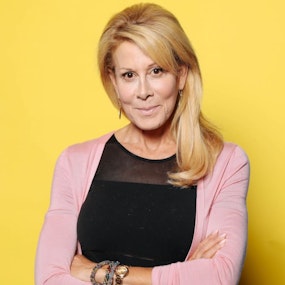
Jillian Manus // Structure Capital
Investor on The Pitch Seasons 1–11
Jillian Manus is Managing Partner of an early-stage Silicon Valley venture fund, Structure Capital. Branded “Architects of the Zero Waste Economy," they invest in underutilized assets and excess capacity. She was named one of the top 25 early-stage Female Investors by Business Insider in 2021. Jillian serves on numerous corporate and non-profit boards, these include: Stanford University School of Medicine Board of Fellows, NASDAQ Entrepreneurial Center Board of Directors, Fuqua School of Business at Duke University.
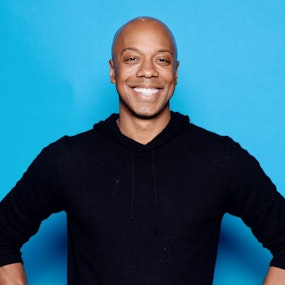
Charles Hudson // Precursor Ventures
Investor on The Pitch Seasons 2–11
Charles Hudson is the Managing Partner and Founder of Precursor Ventures, an early-stage venture capital firm focused on investing in the first institutional round of investment for the most promising software and hardware companies. Prior to founding Precursor Ventures, Charles was a Partner at SoftTech VC. In this role, he focused on identifying investment opportunities in mobile infrastructure.
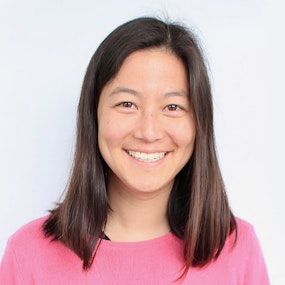
Elizabeth Yin // Hustle Fund
Investor on The Pitch Seasons 6–11
Elizabeth Yin is the Co-Founder and General Partner at Hustle Fund, a pre-seed fund for software startups. Before founding Hustle Fund, Elizabeth was a partner at 500 Startups, where she invested in seed stage companies and ran the Mountain View accelerator. She’s also an entrepreneur who co-founded the ad-tech company LaunchBit, which was acquired in 2014. Her book is called Democratizing Knowledge: How to Build a Startup, Raise Money, Run a VC Firm, and Everything in Between.
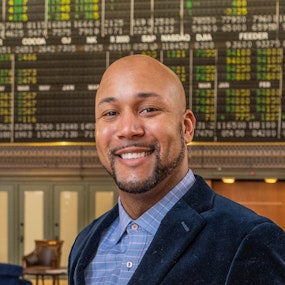
Kelvin Johnson
CEO
CEO & Co-founder of Brevity Pitch, an AI-powered software helping professionals create and deliver persuasive pitches. Kelvin Johnson has versatile career experience as a CPA, consultant, and executive at a fast-growth tech startup in Denver. He is the author of the forthcoming novel, “Don’t Fear The Sharks: Six Principles to Pitch Investors,” coming out in January 2023. Johnson graduated from Villanova University with a Master's of Accountancy.
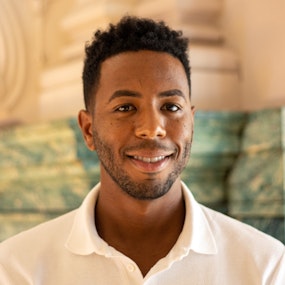
Maximilian Huc
Chief Revenue Officer at Brevity
Maximilian Huc attended Princeton University as a collegiate athlete and then earned a Masters Degree in Business Administration from the University of Virginia Darden School of Business. With experience co-founding multiple start-ups, Maximilian proved to be a perfect match for Ilera Healthcare post MBA, where he was tasked to create a world class sales organization from the ground up. Scaling revenue for 5M to 75M in two short years, Maximilian’s efforts proved instrumental in Ilera Healthcare’s eventual 9-figure acquisition. Setting his sights forward, Maximilian co-founded Brevity Pitch Inc., an AI-powered software guiding professionals to create persuasive pitches that sell. In short time, Brevity Pitch is set to become the #1 high stakes communications enablement software in the World!

Neal Sáles-Griffin
Investor on The Pitch Season 9
Neal Sáles-Griffin is an entrepreneur, teacher, and nonprofit leader. He co-founded the first beginner-focused in-person coding bootcamp, and ran for mayor of Chicago in 2019. He's currently the Managing Director of the Techstars Chicago accelerator as well as the Techstars Rising Stars fund, and is an Adjunct Professor at Northwestern University's McCormick School of Engineering where he teaches entrepreneurship.
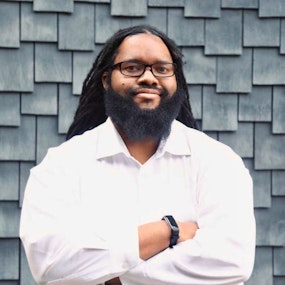
Mac Conwell // RareBreed Ventures
Investor on The Pitch Seasons 9 & 11
McKeever "Mac" Conwell II is managing partner at RareBreed Ventures. Mac is a former software engineer and was a former DOD contractor with top-secret clearance. He was a two-time founder with an exit and a failure. Next Mac moved on to venture capital via the Maryland Technology Development Corporation as part of their seed investment team. Mac went on to found RareBreed Ventures, a pre-seed to seed venture fund that invests in exceptional founders outside of large tech ecosystems.
Where to start
New to The Pitch? Start with episode 101 to hear Josh Muccio pitch investors on his own show.








